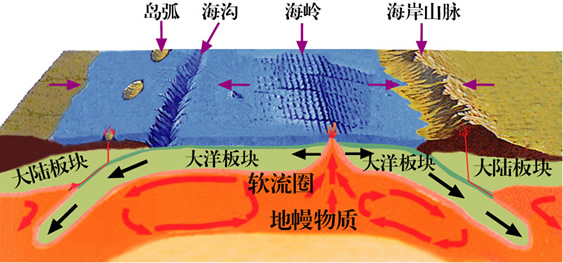(单词翻译:单击)
Wegener developed the theory that the world's continents had once come together in a single landmass he called Pangaea, where flora and fauna had been able to mingle, before the continents had split apart and floated off to their present positions. All this he put together in a book called Die Entstehung der Kontinente und Ozeane, or The Origin of Continents and Oceans, which was published in German in 1912 and—despite the outbreak of the First World War in the meantime—in English three years later.
魏格纳提出了一种理论,认为世界上的大陆原先属于一个陆块,他称其为“泛大陆”,植物群和动物群可以混杂在一起;只是到了后来,联合古陆才裂成几块,漂移到现在的位置。他写了《海陆的起源》一书来阐述他的观点。1912年,该书以德文出版──尽管两年后爆发了第一次世界大战──三年以后又出版了英文本。
Because of the war, Wegener's theory didn't attract much notice at first, but by 1920, when he produced a revised and expanded edition, it quickly became a subject of discussion. Everyone agreed that continents moved—but up and down, not sideways. The process of vertical movement, known as isostasy, was a foundation of geological beliefs for generations, though no one had any good theories as to how or why it happened. One idea, which remained in textbooks well into my own school days, was the baked apple theory propounded by the Austrian Eduard Suess just before the turn of the century. This suggested that as the molten Earth had cooled, it had become wrinkled in the manner of a baked apple, creating ocean basins and mountain ranges. Never mind that James Hutton had shown long before that any such static arrangement would eventually result in a featureless spheroid as erosion leveled the bumps and filled in the divots.
由于战争,魏格纳的理论起初没有引起多大注意。但是,他在1920年出版了修订本,并进行了扩充,它很快成了人们讨论的话题。大家都认为,大陆在移动──不是左右移动,而是上下移动。垂直移动的过程,即所谓的地壳均衡,是几代人地质信念的一个基础,虽然谁也提不出令人信服的理论来解释它是怎么发生的,或为什么发生。有一种见解直到我上小学时还在教科书里出现过,那就是在世纪之交由奥地利人爱德华·休伊斯提出的“云莓干”理论。该理论认为,随着灼热的地球冷却下来,它皱缩成云莓干的模样,创建了海洋和山脉。且不说詹姆斯·赫顿早就说过:真是这样一种静止的安排的话,由于侵蚀作用夷平了凸处,填平了凹处,地球会成为一个毫无特色的球体。


